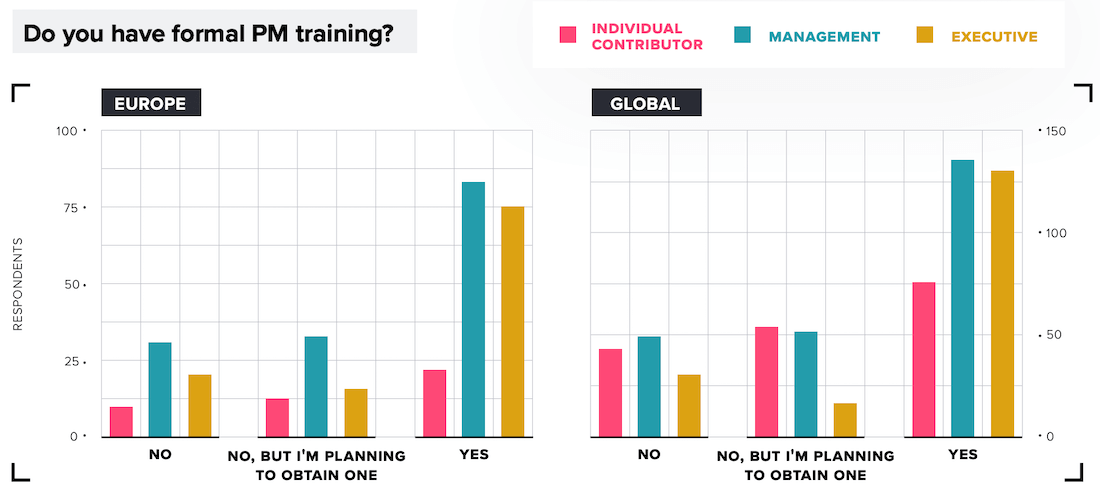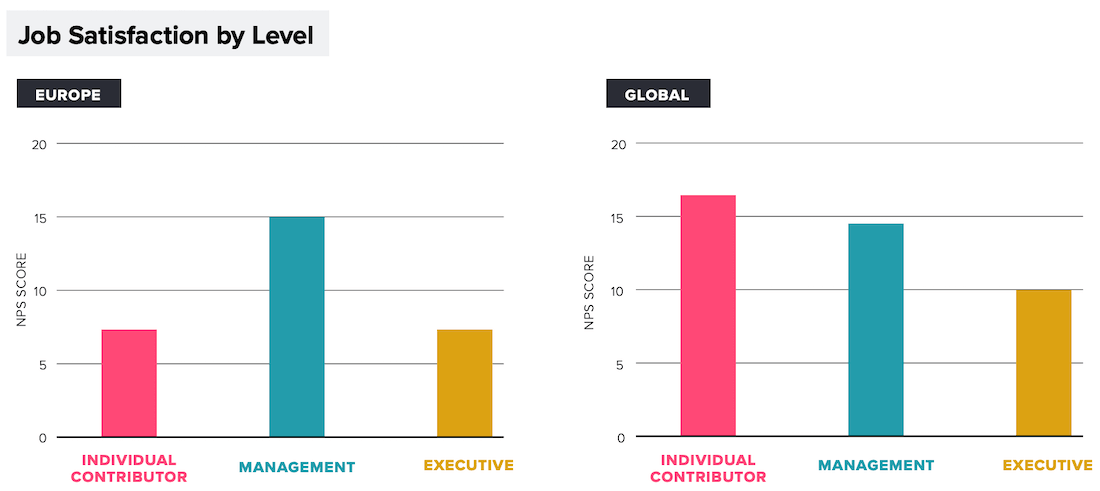Back in January, our colleagues at Pendo released their third-annual State of Product Leadership report. Each year, this report compiles the survey responses of hundreds of product leaders, who share their job responsibilities, key challenges, and workplace trends. This year’s survey reached a more global audience than ever, with nearly half of respondents living in Europe. As a result, the Pendo team released a Europe-focused version of the State of Product Leadership report, which offers a more granular, geo-specific view of the European approach to product management. Here are a few of the main takeaways.
European PMs are particularly committed to going back to school
With the rise in popularity of product management as a discipline has come an increase in the number of formal PM education programs. These range from full master’s degree programs (like Carnegie Mellon’s first-of-its-kind MS in PM) to certificate programs from organizations like General Assembly and Product School.
In fact, the first finding listed in the full 2020 State of Product Leadership report was that PMs who had completed advanced training were more likely to move up the career ladder. This was true across geographies, with European PMs also realizing that a PM degree is more than just a piece of paper — it’s a ticket to a promotion. While European PMs are less likely than the global average to have already completed advanced training, they are more likely to be actively pursuing it. This is especially true of German product leaders, who are seeking out additional PM certifications in greater numbers than their colleagues in the UK and France.

European product leaders rely on social listening for customer feedback
Like PMs globally, European product leaders have moved away from “gut instinct” as a method for making product decisions. Instead, product analytics data and customer feedback drive their strategy. We’ve seen more emphasis on the importance of qualitative customer feedback lately, but gathering it can be a challenge. While the top source of customer feedback globally is the trusty survey, it takes second place in Europe. The European winner? Social listening.
The customer feedback you receive on social channels can be truly valuable (Twitter trolls and bots notwithstanding). However, it can also be a bit harsh, even extremely critical. However, social media might also be your most honest feedback source. Unlike survey responses, comments on your Twitter and Facebook feeds are unsolicited and unfiltered.
The happiest product managers in Europe are … managers
In general, PM job satisfaction is, to put it bluntly, not all that high. However, some roles are happier than others. Globally, product managers like their jobs less and less the higher they move up the career ladder. That’s not the case in Europe, however. European product professionals in managerial roles have an average NPS of 15. That’s more than twice as high as the average NPS of both individual contributors and executives. Perhaps the manager role lies in the sweet spot between being a stressed-out executive and an overworked but potentially underappreciated individual contributor.

In France, PMs are especially satisfied with their jobs. French PMs were most likely to recommend the PM role to a friend and gave their job a higher NPS than their colleagues in the UK, Germany, and North America.
“Quants” and “poets” are more balanced on European product teams
One of the most surprising findings from the overall State of Product Leadership report was that PMs are more tech-focused than ever. This year’s survey respondents were more likely to come from a technical background like engineering than a business-focused one like marketing. They even said they’d probably be writing code if they weren’t working in product.
In Europe, however, product teams are more balanced between technical and “soft” skills. While technical backgrounds have a slight advantage (39%), non-technical ones are close behind (37%). In the UK in particular, business-focused backgrounds are especially prevalent. Nearly 30% of UK-based PMs studied business before moving into a product management role. That percentage is 17% in Germany and 13% in France. And while technical acumen is certainly useful for a PM, understanding the customer is just as, if not more, critical to success.
Want even more insights on the European product management landscape? Read the rest of Pendo’s 2020 State of Product Leadership: Europe report. You can download it here.

